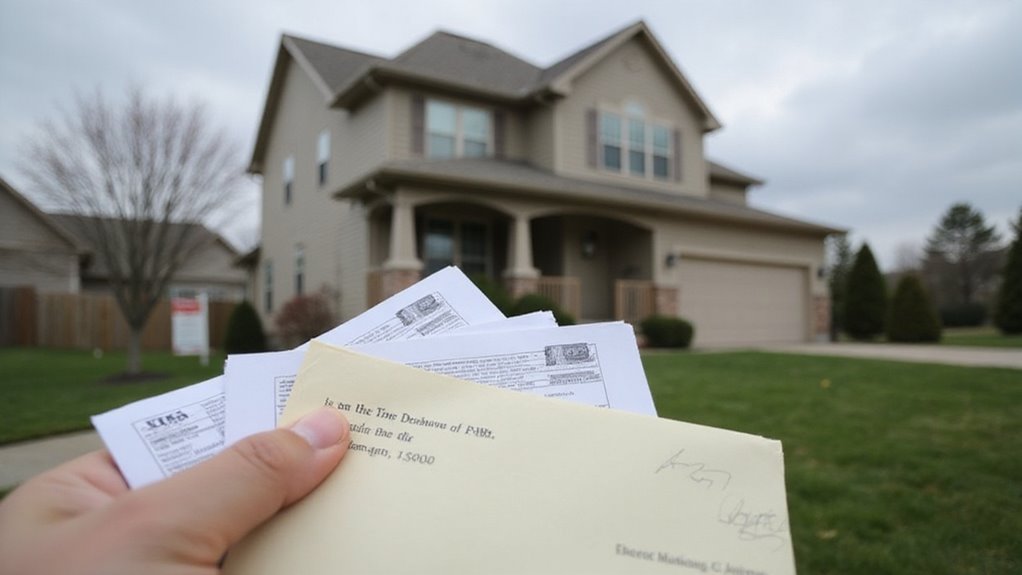Selling a house with a tax lien in Kansas City can feel like an impossible task. Many homeowners worry that unpaid taxes will scare away buyers or block the sale completely. This situation creates stress and confusion for anyone wanting to move forward quickly.
The process can become complicated and frustrating. Unresolved tax liens can delay closings, reduce your home’s value, or even make the sale fall through.
Buyers may hesitate if they sense legal or financial risks tied to your property. You can sell a house with a tax lien in Kansas City by following simple steps and working closely with the right people.
This blog explains what you need to do, who to contact, and how to avoid common mistakes. You will learn how to clear the path to a successful sale. This guide will help you handle a tax lien and sell your house with confidence.
Key Takeaways
- Pay off the tax lien in full or arrange to have it paid from sale proceeds at closing to clear the property title.
- Obtain an official payoff statement from the county to determine the exact amount owed, including interest and penalties.
- Disclose the tax lien to potential buyers early and provide clear documentation to avoid legal issues and delays.
- Work with experienced professionals—real estate agents, title companies, and attorneys—familiar with tax lien sales in Kansas City.
- Consider selling to cash buyers or investors, as they are often more willing to purchase properties with tax liens.
Understanding What a Tax Lien Is

A tax lien is a legal claim placed on your property when you do not pay property taxes. The government uses this lien to collect unpaid taxes, interest, and penalties. This lien becomes part of public records.
A tax lien takes priority over most other claims on your property. It can make selling or refinancing your home very difficult. Potential buyers may lose interest if they see a tax lien. Cash buyers often consider homes with liens, as they typically purchase properties as-is and can move quickly through the process.
Lenders are less likely to approve a loan if your property has a tax lien. If you want to stage your home for sale, the tax lien can reduce your chances of success. Addressing the lien first is important for a smooth sale and accurate property value. In some cases, selling your house as-is without inspection may help you attract cash buyers who are willing to deal with a tax lien.
Reasons Tax Liens Are Placed on Kansas City Properties
Tax liens are placed on Kansas City properties when owners do not pay property taxes on time. The city uses these liens to make sure it collects money owed. Liens can also come from special assessments, code fines, or unpaid fees.
If a property has code violations or environmental hazards, the city may add more liens. Zoning rule violations can also result in added costs for the owner. The city enforces these rules to keep the community safe. In some situations, animosity impacts the home sale’s bottom line when dealing with properties that have liens, especially if there are disputes between co-owners or heirs.
Common lien sources include missed property tax payments, unpaid infrastructure fees, and unresolved safety issues. If you understand these reasons, you may avoid future liens on your property. In some cases, outstanding liens or mortgages must be resolved before you can sell the property.
How a Tax Lien Impacts the Home Selling Process

A tax lien makes selling your home much harder. The lien is attached to the property’s title. You cannot transfer a clear title until you resolve the debt.
Buyers and lenders see the lien as a risk. They may avoid your home or offer a lower price. If there is a tax lien, many lenders will not approve a loan for buyers. Since financing fall-throughs are common when liens are involved, cash buyers can be an attractive solution in these situations.
Your home may take longer to sell if a lien exists. You might get fewer offers and sell for less money. Resolving the lien before listing the home can speed up the process. In most cases, a tax lien holds priority over other claims on the property, which means it must be addressed first before any sale can go through.
Identifying the Amount Owed on the Tax Lien
To find out how much you owe on a tax lien, get an official payoff statement. This statement comes from the county tax office or government agency. It lists the principal, interest, and penalties.
If you request this document, you will see the exact amount owed. Check for the most recent figures because fees can increase quickly. Using old numbers could lead to mistakes. Local experts, such as Kansas City home buyers, often recommend verifying this information to ensure an accurate and stress-free transaction.
Compare the tax lien amount to your property’s value if you want to sell. This helps you know how much equity you have. Accurate numbers help you set a fair price.
Knowing the lien balance helps you plan your next steps. You can decide how to spend your money on home improvements. If you stay informed, you can avoid surprises during the sale.
A professional appraisal can help you establish property value for both tax and sale purposes, ensuring you have the correct information when making decisions.
Options for Paying Off the Tax Lien Before Selling

You can pay off a tax lien before selling by clearing the debt in full. This can be done using your savings or a short-term loan. Resolving the lien will ensure a clean title transfer. If you want to avoid delays and reduce stress, consider the advantages of cash buyers for a faster home sale.
If you cannot pay in full, you may ask the tax office for a payment plan or settlement. You must get written proof the lien is released before closing. Always confirm the agreement meets Kansas City rules.
A higher sale price may help cover the lien if your home is in a good area. Staging your home can also increase its value. Higher proceeds at closing may allow you to pay the lien from the sale.
Consider talking to a real estate attorney or tax expert. They can guide you through the process. This helps you avoid legal issues when selling in Kansas City. If you are selling to cash home buyers, they will typically require proof that the tax lien has been cleared to ensure a legal and hassle-free transfer of ownership.
Selling Your House “As-Is” With a Tax Lien
Selling your house “as-is” with a tax lien in Kansas City means you sell the home in its current state. You must tell buyers about the tax lien before the sale. Buyers often lower their offers because of the lien and the home’s condition. You can usually expect cash buyers to be more willing to purchase property in this situation, since they can close quickly and often accept homes in less-than-perfect condition.
Most buyers in these cases are investors or people paying cash. Home staging usually does not matter much in these sales. If you skip repairs, you save time but might get a lower price.
You must give buyers clear records about the lien. Setting a fair price helps attract more interest. If you focus on honesty, your sale will likely move faster. Selling “as-is” with a tax lien works best if you want a quick and certain sale. If you want the highest price, this may not be the best option.
It can also be helpful to consult with an estate attorney, as state laws may affect how you disclose the lien and transfer ownership in these situations.
Working With Real Estate Agents Experienced in Tax Liens

Selling a home with a tax lien is complicated. A real estate agent with experience in tax liens can make the process easier. These agents know the special steps needed for these types of sales.
They understand how a tax lien affects your home’s value. They also know current market trends in Kansas City. This helps them set the right price for your property. It’s important to avoid unrealistic pricing to ensure your home attracts serious buyers and doesn’t stay on the market too long.
An expert agent will work with title companies and legal professionals to avoid problems at closing. If you choose an agent, check if they have handled tax lien sales before. You should also look for strong negotiation skills and clear communication.
It’s also important to work with someone who understands real estate market fluctuations, since timing and market conditions can influence your home sale outcome when dealing with a tax lien.
Negotiating With Buyers When a Tax Lien Exists
A tax lien is a legal claim on your property. Buyers usually become cautious and want to know exactly how the lien will be resolved. You should provide clear documents that show the lien’s amount and current status.
Buyers may lower their offers or ask for concessions because of the lien. Strategic home staging can increase your property’s appeal and help keep its value higher. You should be ready to explain how the lien affects the title and closing timeline.
If you answer questions honestly and show a clear plan to resolve the lien, buyers will trust you more. This trust can help you reach a successful agreement, even with the lien in place. For those looking for a quicker resolution, working with cash buyers can help speed up the transaction and reduce complications surrounding the lien.
Using Sale Proceeds to Pay Off the Tax Lien

You’ll need to obtain an official payoff statement from the tax authority to determine the exact lien amount, including any accrued interest or penalties. Coordinate with your title company to ensure the lien is paid directly from your sale proceeds at closing, preventing any delays in transferring clear title. Precise timing and documented payment are critical to satisfy the lien and protect the transaction’s integrity.
Calculating Lien Payoff Amount
To calculate the lien payoff amount, start by getting an official payoff statement from the lienholder. This statement includes the remaining balance, interest, and fees. Always check the statement is current before you proceed.
Buyers may worry about issues like the septic system or unclear property lines. These concerns can affect the sale price or closing costs. If these come up, be ready to adjust the terms of the sale.
You must confirm that the payoff amount includes all taxes and fees owed. If you miss any charges, the sale could be delayed. Always check with the county or city for extra charges.
If you are unsure, ask a professional for help. Getting the amount right helps ensure a smooth closing process. This protects both you and the buyer.
Coordinating Lien Payment Timing
Coordinating lien payment timing means making sure the lien is paid at the right time during the property sale. You must work with your title company and escrow agent to pay the tax lien at closing. This protects your interests and meets buyer and lender requirements.
The sale price must be enough to cover both the mortgage and the lien. Accurate property valuation helps avoid financial shortfalls. The homeowner must give all lien documents to the closing agent.
You should respond quickly to any payoff questions from the closing team. Make sure the payoff statement is valid through the closing date. If there are delays, you may need an updated payoff amount.
If you coordinate early, you can avoid last-minute issues. Proactive steps help the transaction go smoothly. Careful planning ensures all parties are satisfied at closing.
Short Sales as a Solution for Tax Lien Properties
Short sales can help homeowners with tax lien properties when regular sales are not possible. This option allows you to sell your property even if you owe more than it is worth.
The lender may agree to accept less than the full mortgage amount. Short sales offer a way to sell your home with a tax lien, even if you owe more than its value.
A short sale does not require good credit or home equity. You will need a professional property appraisal to show the home’s current value. This helps prove the sale price to everyone involved.
If you consider a short sale, you must get your lender’s approval. You also need to talk to tax authorities about releasing their lien. A real estate agent who knows short sales can guide you through the process.
Short sales may speed up the process and reduce your financial risk. This approach can help you move forward if other options fail.
Legal Considerations and Required Disclosures
You must comply with Kansas law requiring full disclosure of any tax liens to prospective buyers, as nondisclosure can trigger legal liability and contract rescission. It’s essential to understand how outstanding liens affect your ability to transfer clear title, since title companies often refuse to insure properties encumbered by unresolved tax debts. Ensure you address these legal obligations early in the process to avoid transactional delays and potential litigation.
Mandatory Lien Disclosure Rules
Kansas law requires sellers to tell buyers about any tax liens on the property. You must give this information before closing. If you do not share this, you may face legal trouble and the sale could fail.
A seller must use the Kansas Seller’s Disclosure form for all tax liens. Written notice is needed before making any agreement with a buyer. If a new lien appears, update your disclosure right away.
Buyers, lenders, and appraisers need full information to check risks and property value. If they find out about undisclosed liens later, the process could stop. Always work with the buyer’s lender and appraiser to confirm any liens.
Title Transfer Legalities
Kansas law requires you to resolve any tax liens before you can transfer a property title. Title companies will not insure the sale if a lien remains unpaid. If you do not clear the lien, you cannot complete the sale.
You must work with the taxing authority to settle the lien and get a release document. Accurate property value helps buyers and lenders make informed decisions. Buyers need to see all lien documents before closing.
If you do not disclose a lien or provide a clear title, closing may be delayed. This could also lead to legal problems later. A real estate lawyer can help make sure you follow all rules.
How Title Companies Handle Tax Liens During Closing
Title companies in Kansas City handle tax liens by making sure all unpaid property taxes are settled before closing. They work to clear any tax debts so the buyer gets a clean title.
Title companies first search for any tax liens on the property. If they find a lien, they contact the tax office to get the exact amount owed. The seller must pay these debts before the sale can finish.
If there is money owed, title companies collect the payment from the seller’s funds at closing. They send this money directly to the tax office. Once paid, they update the records to show the lien is removed.
After all liens are cleared, the title company issues title insurance for the buyer. This insurance protects the buyer from future claims on old tax debts. This process keeps the sale safe for everyone involved.
Potential Delays and How to Avoid Them
You’ll face significant delays if you don’t clear tax liens before closing, as unresolved liens halt title transfer. To expedite the process, coordinate closely with your title company and provide all required documentation upfront. Proactive communication and efficient lien resolution are essential for maintaining your transaction timeline.
Clearing Liens Efficiently
Clearing liens quickly helps you sell your Kansas City home with fewer problems. You should handle liens early to avoid delays. Fast action protects your selling schedule.
Start by getting a payoff statement from the tax office. Make sure you know the total debt and any added interest. If you do not understand the amount, ask questions right away.
Sellers should keep their home attractive to buyers while fixing lien issues. Good staging and knowledge of local trends help keep your home’s value. If you need help, talk to a real estate agent.
Request lien payoff documents as soon as possible. Check that all lien releases are filed correctly. If you keep in touch with the tax authority, you can solve problems faster.
Taking these steps can help you avoid long delays. If you act early, your sale can go smoothly. Proper planning leads to better results.
Coordinating With Title Companies
Efficient coordination with title companies helps prevent delays in your Kansas City home sale. The title company checks for unpaid liens before closing. If you work closely with them, you can avoid last-minute problems.
You should give the title officer all needed documents right away. Respond quickly if they request more information. Sharing a recent property valuation and market analysis helps them confirm if the sale covers the tax lien.
Regular updates from the title company keep you informed. If you clarify each step, you lower the chance of surprises. Being proactive ensures a clear title and keeps your closing on schedule.
Preventing Future Tax Liens on Kansas City Properties
Preventing future tax liens in Kansas City starts with paying your property taxes on time. Property owners should track tax deadlines and stay informed about their payment status. Missing payments can lead to tax liens and legal issues.
Annual checks of your property’s market value help you estimate future taxes. If the value goes up, your taxes may increase. Plan your budget based on these changes.
Always read your property valuation statements for errors. Set reminders for tax payments to avoid missing deadlines. If you are unsure, ask a tax professional for advice.
Stay updated on Kansas City tax rules and market trends. New laws or value changes may affect your tax amount. Being informed helps protect your property investment.
Conclusion
If you need to sell a house with a tax lien in Kansas City, you have clear options. Addressing the lien early and working with the right professionals can help you avoid delays. If you act transparently, you increase your chances of a smooth sale.
If you want to sell quickly or avoid complex paperwork, we can help. We buy houses for cash, even with tax liens attached. Limitless Homes of KC offers a simple and fast solution for sellers in any situation.
If you are ready to move forward, reach out to us today. We will guide you through each step and answer your questions. Contact Limitless Homes of KC now to get started on selling your house with confidence.

